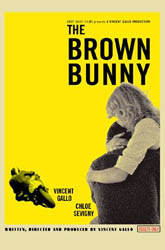 Director:
Vincent Gallo
Starring:
Vincent Gallo
Chloë Sevigny
Release: 27 Aug. 04
IMDb
|
The Brown Bunny

BY: DAVID L. BLAYLOCK
Visceral where it should be obvious and containing an
artiness that veers towards pretentiousness, Vincent Gallo’s The Brown Bunny
is a wreck, but not as bad as the Cannes '03 press would have you believe. With
the festival showing a longer cut of the film, its vocal critics made it
into the pariah of an already disappointing year (Palme d’Or winner Elephant
and also-ran Dogville were also unfairly denigrated -- they will likely lead
my top ten lists for 2003 and 2004, respectively). But The Brown Bunny means
well, and it’s effective in ways that few films are, even if it falls apart
at the end.
Gallo, who got into a tit-for-tat with Roger Ebert that made both look bad,
isn’t a horrible director, just one looking for his grounding. His
1998 film Buffalo ’66 showed his command of
characters and relating story arcs to viewers. It was an assured work
presented as a bumbling, incoherent mess, and its greatness grew from that.
But in The Brown Bunny, Gallo doesn’t deal with actors like he did in
Buffalo ’66. In fact, the film is almost entirely about him, as he drives
cross-country to get to a motorcycle race. The long shots of his character driving and
thinking are revelatory, but, as they become tedious and
repetitive, fail to affect the audience when he comes into contact with
others.
Like Eyes Wide Shut, the crux of the film is a man recently wronged by his
significant other, and now intent on an odyssey of sexual temptations in
hopes of wronging her. Kubrick was less oblique, collecting his thoughts in a
series of scenarios that allowed his star to grow and rethink his
intentions. Gallo’s character, on the other hand, isn’t about growth, just
misery. When the dénouement couples him with the woman he’s so disappointed
with (Sevigny), the pay-off is barely satisfactory (though definitely
pleasing for him). Eyes Wide Shut hinted at the forging power of sex, but
The Brown Bunny only glazes over it; these characters are no more
dimensional than their opening compositions because the director is
unwilling to let them forge for themselves. Instead he leans on a M. Night Shyamalan twist so incoherent that it deserves a collective groan from art
house audiences intent on freeing themselves from the storytelling schemes
too prominent in Hollywood cinema. Maybe that’s why The Brown Bunny was such
an affront to the Cannes press: its disposition may be pretentiously French
(cf. Twentynine Palms),
but its finale is decidedly stupid American.
 |

